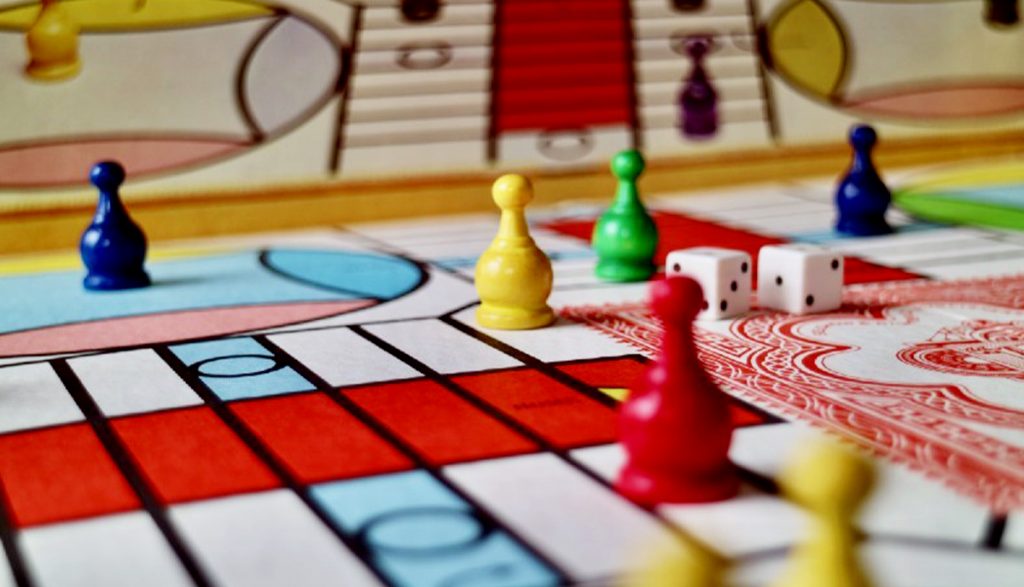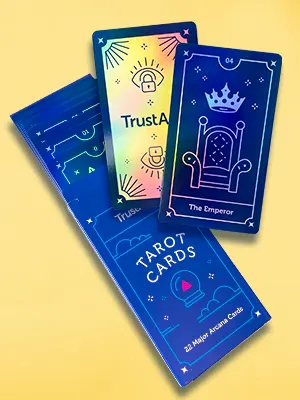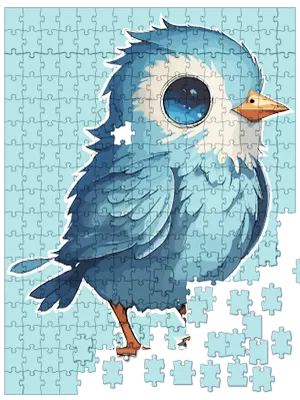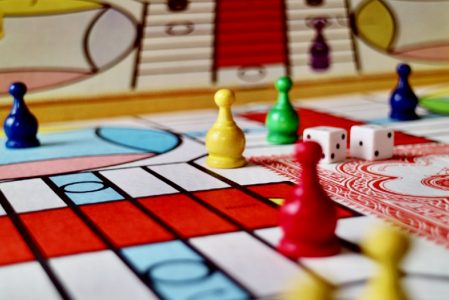How board game mechanics integrate with idea, theme, and rules

Photo by Nik Korba on Unsplash
When you're setting out to create your own board game — whether that's for a small group of friends and family, your game night or club, or to pitch to a major international game publisher — you'll need to get to grips with board game mechanics. There's a lot of mystery surrounding all this, and it can seem off putting to the beginner. But don't worry. In this post, we'll clear away the clouds of confusion and explain the basics of what you need to know.
What are board game mechanics?
Just like the mechanics of a car or household device determine how its parts interact to make it work, board game mechanics are the actions and rules that keep a game running and moving toward its conclusion.
One of the most common mechanics is rolling dice. A rule might say, "Players take turns rolling the dice and move their counter in any direction based on the number rolled." Here, dice rolling determines movement, while additional mechanics—taking turns, counting spaces, and choosing direction—shape how the game progresses.
Tweaking these mechanics changes the game entirely. Limiting movement to one die reduces the number of spaces a player can advance. Restricting direction—like forbidding diagonal moves—adds challenge. Bonus or penalty variations, such as getting an extra turn on a roll of six, introduce new dynamics.
Mechanics and rules are deeply connected. If mechanics are the moving parts of a game's engine, rules are the controls that guide speed and direction. Without rules, mechanics are just disconnected actions.
Most board games use a mix of simple, well-known mechanics. What makes each game unique is how those mechanics are combined and refined. A designer, like an engineer, takes the same fundamental tools and builds something entirely new.
How do board game mechanics work?
Board game mechanics serve two key but opposing functions. They enable players to achieve the game's objective—whether that's reaching a location, collecting sets, eliminating opponents, or occupying territory. But they also impose limits on what players can do each turn. This balance between possibility and restriction creates the challenge, tension, and excitement that make a game fun.
Getting that balance right is crucial. The best way to do this is by playing a wide variety of board games, taking notes on the mechanics you enjoy most, and playtesting your own design repeatedly. Each test should involve different groups, with mechanics tweaked and rules adjusted until gameplay feels smooth, engaging, and fun.
Mechanics and rules also determine game length. If there are too many mechanics or overly complex rules, the game may drag or feel impossible to win. If mechanics are too simple and rules too loose, the game might end too quickly, leaving players bored. The key is finding the right balance to keep players challenged but engaged.
Board game mechanics and freedom of choice
Players need meaningful choices to feel in control of their strategy rather than at the mercy of random dice rolls. When designing mechanics, consider how to give players options. For example, landing on a square might let them choose between drawing a card or rolling an extra die.
Each option should have risks and consequences. A card might boost combat skills but provide only a minor advantage, while an extra dice roll could move a player closer to their goal—but at the cost of missing a potential skill upgrade. Balancing these choices keeps the game engaging.
How board game mechanics integrate with rules and themes
Giving players choices makes them feel invested in the game. To make those choices immersive, mechanics should blend seamlessly with theme and narrative. Players should experience the world of the game, not just its mechanics.
Even simple games do this well. Clue runs on a basic yes/no elimination system, but by letting players decide which rooms, suspects, and weapons to test, it becomes an engaging murder mystery. Stripped of its theme and choices, it would be nothing more than a logic puzzle.
Without choice and theme, mechanics are just math. While we break down game design into separate elements, the best games integrate idea, theme, mechanics, and rules into a seamless experience.
Ready to get the dice rolling?
If you're exploring board game mechanics, chances are you're working on your own design. At QinPrinting, we love board games as much as you do, which is why we offer more than just printing—we help bring games to life.
Beyond printing boards, we assist with prototyping, designing rulebooks, and manufacturing custom components, including tiles, cards, dice, miniatures, and more. We even create custom game boxes to complete the package. Whether you need a small run or full-scale production, we can do it all.
Talk to us. We can help.
Interested? Get in touch today for a no-obligation quote on your project. Or, if you'd prefer, just talk to us about your idea and one of our experts from our experienced team will be happy to explain how we can help realize your dream of a beautiful, unique, custom board game. We look forward to sharing your enthusiasm and putting our experience, knowledge, and state-of-the-art technology at your disposal.
Let's talk! When you're ready to take the next step, just shoot us an email to [email protected] or call us on +1 951 866 3971 and we'll be delighted to do all we can to help you.







Good evening. I created a board game at home several years ago as part of a school project. To this day, my kids, their friends and my nieces and nephews love to play the game. We played it over Christmas and my sister told me I should find a way to mass produce it. Would you be able to send me some information about your company and services? Thank you.
Hi Lisa. That sounds like great fun! We'd be delighted to help you transform your family game into a professional edition. To get started, you might want to check out this informative page: https://www.qinprinting.com/custom-board-games-printing-services/ In the meanwhile, we've asked one of our board game experts to shoot you an email to touch base and see what we can do to help you going forward. Sounds like a great project and we'd love to work with you!